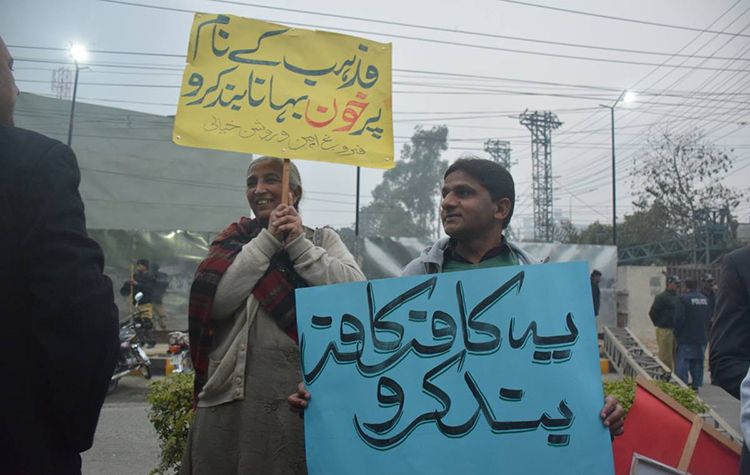(Bangkok, 8 December 2017) – The Asian Forum for Human Rights and Development is greatly concerned about the disappearance of Raza Mahmood Khan, a peace activist from Lahore, who has been missing since 2 December 2017. This new incident cannot be seen in isolation from the outrageous number of disappearances and missing persons in the country. The Supreme Court of Pakistan and Parliamentary Committee on Human Rights have also raised concerns in the last months on the Government’s inaction on this matter. As a newly elected member of the UN Human Rights Council, the Government of Pakistan, needs to take urgent action to address these cases of disappearances, especially that of Raza Mahmood Khan, and all others who are still missing.
Raza Mahmood Khan was last seen at a public discussion about the recent Faizabad sit-in, which he organised at his office on Saturday. Later in the evening, Raza Khan’s phone was turned off, causing his brother and friends to go to his house the next day. On first impression, it seemed nothing was missing from his residence, but on later inspection it turned out that the CPU of his desktop computer had been taken. His family has filed a complaint with the nearest police station, but after the registration of a First Information Report (FIR), no further action or progress has been made to recover him.
Raza Khan was not particularly known for being an outspoken or vocal critic. He was involved with both Aghaz-e-Dosti (Initiation of Friendship), which aims to promote friendly relations between Pakistan and India, and Low-key Lokai, which brings people together for dialogue and debate. However, recently he shared several posts online in which he was critical of the military in the country.
The disappearance of Raza Khan comes at a time the Supreme Court of Pakistan has been questioning and raising concerns about the high numbers of disappearances and missing persons in the country. Earlier this week, during a hearing, the Commission on Inquiry on Enforced Disappearances, which is constituted by the Ministry of Interior, reported that there are 1,498 pending cases of missing persons in Pakistan.
After it was elected to become member of the UN Human Rights Council on October 16, 2017, Pakistan’s Ambassador to the UN, Maleeha Lodhi, tweeted that ‘the election is a ringing endorsement of Pakistan’s strong commitment to human rights. (..) Pakistan’s record of promoting and protecting human rights has been vindicated by this victory.’
It seems that now more than ever would be a good time for the State to validate this commitment to human rights, not just in Geneva, but in the country itself. The alarming trend of people disappearing, particularly bloggers, reporters and human rights defenders, has continued to increase this year. The Commission on Inquiry on Enforced Disappearances also reported that they have received nearly 300 cases of alleged enforced disappearances from August to October 2017 alone, by far the highest number in recent years.
Many of the abductees disappeared for speaking out against or criticising the State, its institutions or the military, such as Punhal Sario, a human rights defender from Sindh, who disappeared on 4 August 2017 and was released mid-October. Also earlier this year, four social media activists were abducted and released after three weeks. Two of them, Aasim Saeed and Ahmad Waqass Goraya, afterwards claimed they were abducted, interrogated and tortured by Pakistani intelligence agencies.
‘FORUM-ASIA strongly condemns all enforced disappearances in Pakistan, including this recent case of Raza Khan. The authorities, in particular the Chief Minister of Punjab should make all efforts to ensure the safe return of Raza Khan and security of his colleagues and family members,’ says Mukunda Kattel, Director of FORUM-ASIA, ‘More than that, in all pending cases of missing persons the State should initiate thorough and transparent investigations. If the Government of Pakistan is as committed to human rights as it claims to be, the top priority should be to address both the pending cases of missing persons, and taking measures to end this disturbing trend.’
Abductions and enforced disappearances are the worst form of censorship practiced by Governments all over the world to silence political dissent and infringe upon the fundamental rights of people. The Government of Pakistan, being a new member of the UN Human Rights Council should demonstrate its commitment towards the protection and promotion of human rights by taking concrete actions. FORUM-ASIA also calls on the National Commission for Human Rights to take a suo motto notice of this abduction and help to realise the immediate safe recovery of Raza Khan.
***
For a PDF version of this statement, please click here.
For further information, please contact:
– South Asia Programme, FORUM-ASIA, [email protected]




